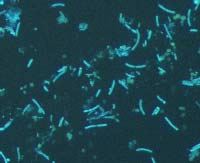Carcinogenic chlorinated solvents are among the most common and persistent groundwater contaminants in all industrialized nations. These compounds include the dry-cleaning agent tetrachloroethene (PCE), the widely used industrial solvent trichloroethene (TCE), and 1,2- dichloroethane (1,2-DCA), a precursor in plastic manufacture. Owing to their significant toxicity, even small spills render groundwater nonpotable, and current methods of cleanup are costly and long-term (years to decades). Very often, the costs for cleanup are so prohibitive that the sites are left contaminated. Bioremediation is a low-cost and potentially highly effective remediation alternative in many cases, provided that it is deployed scientifically.

Micrograph of the KB-1 consortium
Research over the last decade has revealed that several microbial species can actually derive energy for growth from dechlorination. However, while many are able to partially dechlorinate PCE as far as cis-dichloroethene (cDCE) (e.g. Desulfitobacterium, Sulfurospirillum, Dehalobacter) only certain members of Dehalococcoides completely dechlorinate chloroethenes to environmentally benign ethene. Genome sequencing efforts of pure cultures of Dehalococcoides (including Strains 195, CBDB1, BAV-1, and others) have revealed that each strain harbors a distinct suite of genes corresponding to reductive dehalogenases. The mixed culture KB-1, to be sequenced in this project, harbours two different Dehalococcoides strains and a suite of dehalogenase genes that are distinct from those in other strains. These genes may form the basis of accurate diagnostic tools for bioremediation. Most significantly, regardless of Dehalococcoides strain, pollutant biodegradation rates in mixed consortia significantly exceed those observed with pure cultures, emphasizing the relevance of studying communities, not isolates. The goal of this sequencing project is to uncover the major inter-species interactions that dramatically increase the growth and dechlorination rates of Dehalococcoides in mixed culture compared to isolates. This knowledge will improve our ability to grow, manipulate, and deploy Dehalococcoides-containing cultures for bioremediation.
Principal Investigators: Elizabeth A. Edwards and Radhakrishnan Mahadevan (Univ. of Toronto)